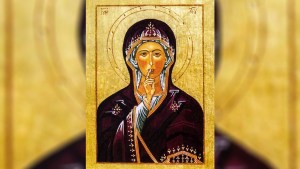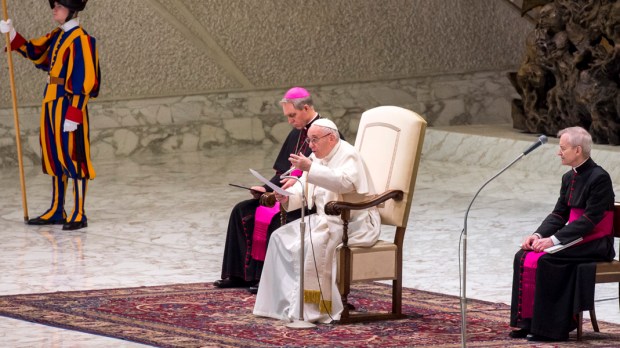“Silence is not limited to the absence of words; rather, we open ourselves to hearing other voices: that of our heart, and above all, that of the Holy Spirit,” said Pope Francis today during his general audience before 7,000 people gathered in Paul VI Hall due to winter weather.
Today, the pope explained the meaning of the “Gloria” and the collect prayer, which form part of the introductory rites of the Holy Mass, in his continuing series of catechesis on the Eucharistic celebration.
In this context, he reiterated that, when the priest invites the faithful to pray during the Eucharist, we are to renew our awareness of being in God’s presence, and offer to Him our personal intentions from the depths of our hearts, participating actively in the Mass.
In this way, the pope insisted on the importance of silence, which helps us to pray. He also invited the faithful to meditate on the Biblical texts and the homily before the Mass is even over.
The “Gloria” hymn
“The Gloria hymn begins with the words of the angels at Jesus’ birth in Bethlehem,” he explained. Then, it continues with “acclamations of praise and thanksgiving to God, who is Father, Son, and Holy Spirit.”
The Gloria hymn represents, “in a certain way, the earth opening itself up to heaven in response to heaven bending town towards the earth,” he said.
Collect prayer
Then, the pope explained that after the Gloria comes “the prayer known as the Collect.”
“With the words ‘Let us pray,’ the priest invites the people to recollect themselves in a moment of silence, so that each one can become aware of being in God’s presence, and can formulate their desires in their spirit,” he added.
In past general audiences on this subject, Francis expressed frustration with people who use cell phones or who chat during Mass; on this occasion, he emphasized that “keeping silent means opening ourselves up to listen to the voice of our heart and, above all, the voice of the Holy Spirit.”
“During the penitential act and after the invitation to prayer,” silence “facilitates meditation; after the reading or the homily, it’s an invitation to meditate briefly on what we have just heard; after Communion, it favors interior prayers of praise and supplication.”
Thus, “before the opening prayer, silence helps us to recollect ourselves and think about why we are there. This is the importance of listening to our soul and then opening up to the Lord.”
Entrust sorrow, joy, and fatigue to God
“Perhaps,” he commented, “we are coming from days of fatigue, of joy, of sorrow, and we want to tell the Lord about that, to invoke His help, to ask Him to be near us; we have families and friends who are sick or who are going through difficult trials; we want to entrust to God the destiny of the Church and of the world.”
Therefore, we need “silence before the priest — gathering the intentions of each and every one — says out loud to God, in the name of all, the common prayer that concludes the introductory rites, thus ‘collecting’ the individual intentions.”
Recollection of soul
To this end, the pope recommended that priests observe this moment of “silence, and not be in a rush: ‘let us pray,’ and then be quiet. I recommend priests do this. Without this silence, we run the risk of neglecting recollection of soul.”
What does the collect prayer contain? First of all, it is an “invocation of God’s name, in which we remember what He has done for us; secondly, it is a supplication, asking Him to intervene.”
“The priest,” Pope Francis continued, “recites this prayer with his arms open, imitating Christ on the wood of the cross. In Christ crucified, we recognize the priest who offers pleasing worship to God, that is to say, that of filial obedience.”

Read more:
Is an icon in the elevator the pope uses every day inspiring his prayer?
At the end of the audience, the pope warmly greeted the pilgrims in various languages.
The Holy Father underlined that “by reflecting on these rich prayers, and uniting ourselves with the Church in lifting them up to God, we see how the liturgy becomes for each Christian a true school of prayer.”
“Let us ask the Virgin Mary to intercede for us, so that the Holy Mass may truly be an authentic school of prayer, in which we learn to speak to God at any moment of our lives. May the Lord bless you. Thank you very much.”
Read more of the pope’s reflections on the Mass:
Why is Sunday Mass important, anyway? The pope explains
The Mass isn’t a show, says pope, chiding those who take cell phone pictures during liturgy
Pope Francis: Why we should go to Mass on Sundays and not be slaves to work

